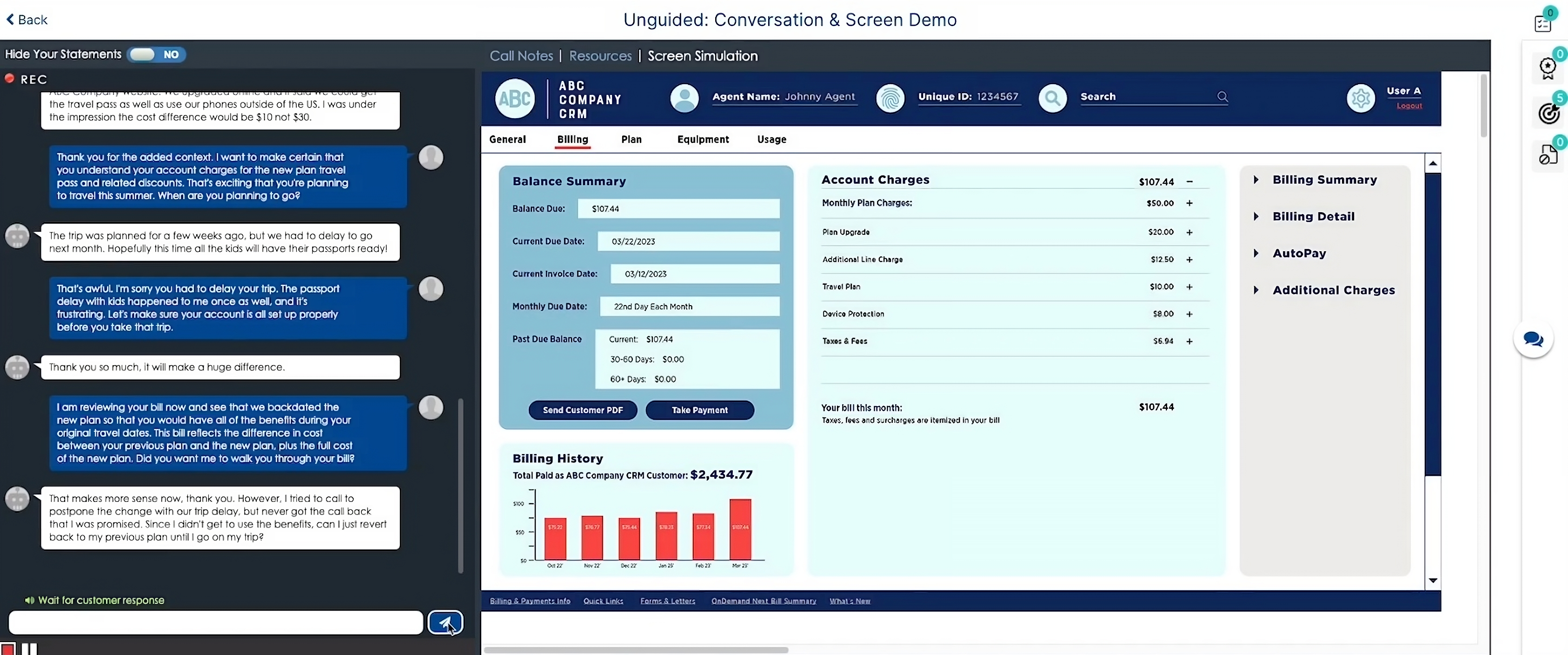While running a 5,000-agent contact center, Brian Tuite often experienced the problem of having to train new agents on the basics. The way he tells it, they weren’t prepared for success — and drained the contact center’s resources.
That gave Tuite the idea of creating what he describes as “simulation training” for customer service agents. After pitching it to Rab Govil, he and Govil decided to turn the concept into a company — Zenarate.
“Zenarate is an AI simulation training platform,” Tuite explained to me in an email interview. “It’s a ‘flight simulator’ for customer and prospect-facing agents, where agents in training are immersed in life-like conversation, screen and chat simulations to master high-impact topics they’ll face with live customers and prospects.”
Using Zenarate’s AWS-hosted platform, service agents engage with an “AI coach” that gives them feedback on their tone and soft skills — making suggestions where appropriate. Agents get a scorecard showing that they’ve mastered certain areas and met baseline requirements, like transitioning from service to sales, juggling multiple chats at once and addressing a customer by name.
The AI coach can present random call scenarios, forcing agents to think on their feet. Or customer service managers can assign particular scenarios to particular agents and teams.
“There’s no IT integration for agents to roleplay with the AI coach from the home or office,” Tuite said, touting what he sees as the benefits of Zenarate’s platform. “The only IT requirements are a Chrome or Edge browser and a headset. And there’s no personal or account information for testing or implementation, as all the content is fictitious training data.”
Of course, Zenarate isn’t particularly unique in the market for sales and agent training software — a market that Polaris Research predicts will be worth $7.74 billion by 2032. Rival Vervoe similarly provides “AI-powered” software that agents can use to prep for different types of live calls. So does Second Nature, which attracted an investment from Zoom’s Apps Fund early last year.
I’m also wary of the ways in which companies like Zenarate apply AI, which could open the door to bias — intentional or no. For example, studies have shown that some AI trained to detect toxicity sees phrases in African-American Vernacular English (AAVE) — the informal grammar used by some Black Americans — as disproportionately “toxic.” It’s not tough to imagine a scenario in which a Black customer service agent repeatedly scores lower than a white agent on a certification test because of the vernacular they use. (No need to imagine; it happens.)
Zenarate claims that its AI isn’t biased. But beyond assuring me that the platform’s AI models are trained with each client’s “best and required practice” data and that clients are charged with overseeing the model training, Tuite didn’t offer much in the way of details about Zenarate’s bias mitigation measures — assuming that it takes any.

Image Credits: Zenarate
If investors share these concerns, they aren’t showing it. Zenarate today announced that it raised $15 million in a funding round led by Volition Capital with participation from a number of undisclosed angel investors.
According to Volition’s Sean Cantwell, Zenarate’s positive unit economics were the winning factor; annual recurring revenue is sitting at “double digits,” currently, driven by an over-80-company-strong customer base with “over a million” users.
“There’s a significant growth opportunity to disrupt legacy passive training methods with the power of simulation training,” Cantwell added. “AI-powered simulation is the new standard in customer service and sales training, and Zenarate is leading the trend.”
Palo Alto-based Zenarate plans to spend the bulk of the new capital — which brings its total capital raised to $18 million — on expanding its workforce from 92 employees to 110 by the end of the year.
